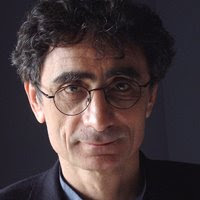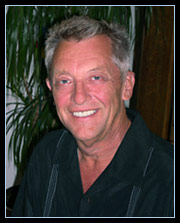Doctor truly follows the oath he took
 Periodically in the realm of journalism you meet a person who not only inspires you by his or her basic defiance of convention, but also a person who makes genuine sacrifices to carry out some sort of self-imposed quest. There are few such people in this world, more's the pity.
Periodically in the realm of journalism you meet a person who not only inspires you by his or her basic defiance of convention, but also a person who makes genuine sacrifices to carry out some sort of self-imposed quest. There are few such people in this world, more's the pity.Dr. Gabor Mate is one-such, however. A few months ago I had the privilege of interviewing Mate; to find out what makes him tick, and why he, as a medical practitioner gave up a posh practice to work amongst the outcasts and rejects of the meanest streets in the meanest neighbourhood to be found in North America.
The result was an article I wrote for the Victoria Times-Colonist. Yesterday the article ran, so now I am free to share it with you. So, if you will grant me a bit of self-indulgence, I will offer it, mainly because I want to expose you to the work of a unique human being.
By Ian Lidster
Dr. Gabor Maté is a slight man with a somewhat reserved bearing that renders it difficult to envision him dealing one-on-one with some of the most challenged and challenging addicts from the streets of despair in Vancouver’s notorious Downtown Eastside.
But, it is front-row centre in that appalling neighborhood that Maté’s medical clinic sits, in the aged and crumbling Portland Hotel, whence he has been carrying out his often thankless, challenging, and too often tragic chore amongst society’s ‘discards.’ Disease and death is the norm with them, rather than the exception.
In the Realm of Hungry Ghosts, newly published by Alfred A. Knopf, Canada, and available in local bookstores for $34.95, is the tale of one doctor’s quest to minister to the health and well-being of the chronically unhealthy and unwell, who are unhealthy and unwell due to a ‘lifestyle’ that evokes either the despair or contempt of uptown society.
In the Realm is not, however, just a narrative of life among the junkies hookers and mentally ill who populate the mean streets and alleyways – though intensely readable narrative it assuredly is – but also a presentation of his view about officialdom’s failure to bring about solutions to a scene that afflicts us all, whether in Vancouver, Victoria, or countless other communities in the province.
It’s a story of usually benign, but sometimes prejudicially-inspired neglect and rejection. The addicted are, in the eyes of many, slightly less than human. They are unworthy of our attention unless they panhandle us for dope money (let’s be honest about the motivations of the guy or girl who hits us up), rob us, commit unpleasant acts like public urination, pass out in doorways, or aggress. Then they get our attention, and they get the attention of officialdom.
Far-removed from that squalor is a comfortable and elegantly appointed lounge at the Empress, though the human reminders of his client-base are never far away on the streets of the provincial capital. Therein a short time ago, Maté shared some thoughts on what inspired this particular book.
“In the first place, I am a writer who works as a doctor,” said Maté, by way of explaining that writing is more than just an avocation for him. He is also the author of such bestsellers as Scattered Minds, and When the Body Says No. He is the former medical columnist for the Globe and Mail, and still writes for that newspaper on such issues as health and parenting.
What is vital to Maté is that we must change our approach to not only the highly-charged concept of addiction per se – mainly for the obvious reason that what we have been doing hasn’t worked worth a damn – but for that change to happen, we must develop an understanding of the addict. Addicts do not choose to become addicts, but certain conditions, he has found, are common to most of them.
“These are people who persistently indulge in compulsive behavior with negative consequences,” he says. “The similarities among them consistently intrigue me.”
Another point made by Maté is that, their actual addiction, whether it is to heroin, cocaine, crystal meth or alcohol notwithstanding, the average street addict is not so very different from most of us. Their lifestyle is different, and the threats to their well-being are virtually constant, but the harmful addiction remains a behavior. An exaggerated form of compulsive behaviors many of us possess.
In one section of In the Realm, Maté refers to his own addiction – and he thoroughly regards it as an addiction and trivializes it not at all – to purchasing classical music CDs. His obsession about such music acquisitions defies all logic, and he even attempts to hide his purchases and to not make appointments for the sake of ‘scoring’. This is classic addictive behavior.
While one critic at least scoffed slightly at Maté’s analogy, Maté defends its inclusion in the sense that, while the harm in being a CD junkie may be minimal, it still gives him empathy because the illogic of the process is the same.
He explains one of his music-buying sprees thusly:
“When you get right down to it, it’s the adrenaline I’m after, along with the precious reward chemicals that will flood my brain when I hold the new CD in my hand, providing an all too temporary reprieve from the stress of my driven state. But, I’ve barely left the store before the adrenaline starts pumping through my circulation again, my mind fixated on the next purchase. Anyone who’s been addicted to any kind of pursuit – whether it’s sex or gambling or shopping – is after that same fix of home-grown chemicals.”
Yet, he also observes that while the chemicals coursing through the system at the moment of realization of the score are the same in both cases, the consequences for the street addict are gravely different and more disastrous.
Areas in common among most addicts with whom he’s dealt, says Maté, include childhoods that were often fraught with abuse, physical and sexual, multi foster homes in many cases, dysfunctional parents and many other societal negatives.
“Consequently the drugs they use are their only safe place,” he says. “They provide temporary solace from immense personal pain.”
There is also an immaturity that for many addicts is virtually incipient. They learned at an early stage of development that there were behaviors and substances that could take them away from the pain.
“These people get stuck at a stage of pre-toddler soothing and as they carry on they don’t develop,” he says. “Therefore, they’ll exhibit antisocial behaviors that are almost childlike. This isn’t just emotional; it’s actually a physical immaturity of the brain. It can be seen in the brains of longtime substance addicts in which no growth pattern is evident. The white matter does not increase. Consequently, in answer to critics who maintain that addiction is a matter of choice, many addicts literally do not have the brain ability to make considered choices.”
Solutions? Maté, with In the Realm, makes some strong suggestions. Suggestions that will demand a change in the ethic of western society. In that he supports the concept of harm reduction, despite how charged a concept that is for those who see it as pandering to dysfunctionals who, in the esteem of harm reduction critics, should be treated in a more unforgiving and draconian manner. Demands for abstention are unrealistic, he says, especially when the addict is heavily into his or her substance. They cannot make that choice.
“Addicts need a clear sense of ‘other possibility’; some sort of spiritual opening that will let in some light in their lives,” Maté says. “More addicts could ultimately get clean if the circumstances were right.”
That, he suggests, would call for a paradigm shift in which society would have to change a social ethic away from only valuing human achievement, rather than basic humanity per se. He sees the current approach to drugs as lacking in compassion. In other words, if you live a certain lifestyle, then you are unworthy as a human being and we owe you nothing. Persisting with such an attitude is bound to continue failing, as it is failing now.
(Victoria Times-Colonist, June 15/08)
Labels: A genuinely unique man


13 Comments:
Love it! Absolutely love it! Now I want to read some of Mate's books.
I have heard Mate being interviewed on CBC Radio 1 and been riveted. I love a true role model. (PS Have you written for the T-C in the more distant past? If so, you may be aware of my cousin, who retired early due to a heart ailment, Lon Wood.)
i heard some of the same programs, andrea, a true altruist that man
nicely done, ian....
Excellent article Ian on a truly selfless soul. I have heard of him before - he is a genuine altruist.
Very well written, Ian. Thanks so much for sharing with us all. I definitely agree that the good doctor is on to something. I'm always thinking about addictive behaviors I have -- everyone else in my family is addicted to something so I don't think it's skipped me even though I don't use anything "chemical" -- I buy books compulsively. I have ones I haven't even read yet -- but every time I go to the bookstore, I get another one. I also love how he says that we have to get away from just valuing human achievement. Amen to that!
Great man. Great article. Thanks for sharing it.
Oh My GOD! Ian, this is amazing. I'm in awe that you met one of my heroes, Dr. Mate.
True story. After my sister died (diabetes and scleredema) I discovered his book "When the body says no". Dr. Mate treats a lot of Scleroderma patients. That book was an incredible eye opener.
Shortly after reading his book, I was diagnosed with my disorder. At the same time, I was part of a trauma therapy group. The trauma treatment program here is one of only 3 or 4 in North America. So, I showed them Dr. Mate's book, and they adopted it as a goldmine for their program. It has since been distributed far and wide. I also recommend it to people with my disorder, as it correlates the effects of stress on physical health.
Dr. Mate is an incredible human being. I'm a huge fan of his.
Great interview Ian and thanks for sharing this. I first heard about him via his Globe & Mail column years ago.
An amazing article about an amazing person -- I will go out and read "In the Realm of Hungry Ghosts".
This is brilliant Ian, really interesting. I too will have to go and find out more about Dr Mate- he sounds incredible.
I ansolutely agree about treating the addict with compassion and with the understanding of what drives them to use. And I like the Buddhist take on it.
Not so sure about calling all compulsive behaviors (like CD buying) addictions, though. I tink there are some fundamental distinctions that are critical.
A great article Ian, he sounds like an incredible man.
Excellent article Ian on a very interesting man. I have read his column on occasion too.
I must check out his books too.
Excellent. Makes me want to read his books too.
Post a Comment
Subscribe to Post Comments [Atom]
<< Home